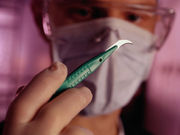Fat grafting linked to improvement satisfaction, psychosocial well-being, sexual well-being
THURSDAY, June 29, 2017 (HealthDay News) — For patients undergoing breast reconstruction, fat grafting may improve patient-reported outcomes, according to a study published online June 28 in JAMA Surgery.
Katelyn G. Bennett, M.D., from the University of Michigan Health System in Ann Arbor, and colleagues conducted a longitudinal study at 11 sites associated with the Mastectomy Reconstruction Outcomes Consortium Study involving 2,048 women.
The researchers found that 165 women (8.1 percent) underwent fat grafting between years one and two. Compared with those who did not receive subsequent fat grafting, patients who later underwent fat grafting reported significantly lower breast satisfaction (adjusted mean difference [AMD], −4.74; 95 percent confidence interval [CI], −8.21 to −1.28; P = 0.008), psychosocial well-being (AMD, −3.87; 95 percent CI, −7.33 to −0.40; P = 0.03), and sexual well-being (AMD, −5.59; 95 percent CI, −9.70 to −1.47; P = 0.008) at one year postoperatively. At two years postoperatively, the fat-grafted cohort reported similar breast satisfaction (AMD, −0.68; 95 percent CI, −4.42 to 3.06; P = 0.72), psychosocial well-being (AMD, −0.59; 95 percent CI, −3.92 to 2.74; P = 0.73), and sexual well-being (AMD, −2.94; 95 percent CI, −7.01 to 1.12; P = 0.15).
“Fat grafting may improve breast satisfaction, psychosocial well-being, and sexual well-being in patients undergoing breast reconstruction,” the authors write.
Copyright © 2017 HealthDay. All rights reserved.








